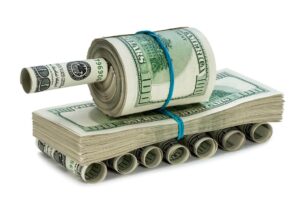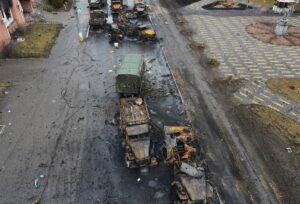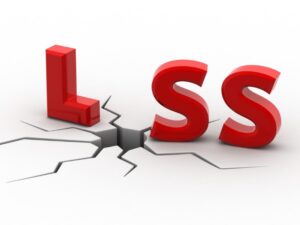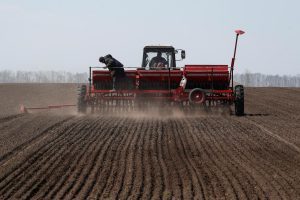
The French reinsurer SCOR tentatively estimates the volume of compensation as a result of Russia’s military attack on Ukraine at “a high double-digit figure in millions of euros”, while warning that the company could end the first quarter of 2022 with a loss.
As reported on the website of the reinsurer, SCOR became the first of the global reinsurers to publish information about how much the war in Ukraine could cost their business.
It is also noted that the total losses of the industry as a result of this war will be equivalent to a catastrophic event of a medium scale (from EUR15 billion to EUR30 billion). But given that hostilities affect insurance payouts, and given the considerable uncertainty as hostilities continue, it is now very difficult to give an accurate estimate, SCOR said.
By announcing early first quarter results, SCOR definitely wants to give shareholders and the market a picture of what to expect. SCOR’s strategy is to reserve funds “as large as possible as early as possible”.
The company is closely following the course of events in Ukraine, which makes it possible to adequately assess the potential impact of the aggressor’s military actions and international sanctions against Russia on global reinsurance.
SCOR emphasizes that its subsidiary in Russia has suspended the signing of new reinsurance contracts.
The company emphasizes that payments are expected under political risk, credit risk and aviation insurance reinsurance contracts.
The reinsurer noted that these payments will be attached to other payments in the first quarter of 2022, in particular for damage due to natural disasters (including floods in Australia, European snowstorms, drought in Brazil) and the continuation of the Covid-19 pandemic in the United States.
“Such situations will negatively affect the combined ratio for P&C insurance (property insurance), as well as the technical result of life and medical insurance. This is expected to lead to losses for the quarter,” the company notes.
SCOR also stated that the company is well capitalized and has a strong solvency ratio.

Prime Minister Denys Shmyhal says that from the point of view of state budget expenditures, a day of war costs UAH 2 billion, and from the point of view of losses – $4 billion.
“There are two numbers. How much a day of war costs in terms of state budget expenditures, how much we pay, and how much we need. This is in the region of UAH 2 billion, which is what it costs us to conduct hostilities, pay wages, and so on. And there are other expenses – $4 billion in losses, which costs us every day of the war in terms of the destruction of our infrastructure, the loss of economic potential, the loss of future GDP,” Shmyhal said in an interview on the air of the national telethon on Friday morning.
The prime minister said that Ukraine’s losses are, among other things, a reduction in the sowing campaign by 20% and the inability to fully realize its export potential.

The State Agency for Highways of Ukraine (Ukravtodor) estimates the losses from damage to road infrastructure during the war with Russia at UAH 874 billion. “As of April 3, 23 thousand km of roads and 273 artificial structures – bridges, overpasses, etc. – were destroyed throughout Ukraine. The total amount (losses – IF) that we have already calculated is UAH 874 billion. That is, the restoration of those artificial structures and roads that were destroyed in this war will take such an amount: roads for UAH 835 billion and bridges for UAH 39 billion,” Andriy Ivko, first deputy head of Ukravtodor, said at a briefing at the Ukrainian Media Center on Sunday. He also stressed that Ukravtodor is counting the damage to the road infrastructure on a daily basis. “But we are already preparing for restoration, we are preparing design documentation for roads and bridges. So that when the war ends and we win, we can start work as soon as possible,” Ivko said. Most of the destruction, according to him, suffered roads in the East, South and part of the North of Ukraine.

Ukraine’s losses from destruction due to a full-scale war against Russia amount to at least $100 billion, the war has led to a complete shutdown of half of Ukrainian enterprises, Oleh Ustenko, adviser to the President of Ukraine, said.
“Currently, about 50% of our business is not working. The rest of the enterprises are operating at the limit of their capabilities,” Ustenko said during an online discussion hosted by the Peterson Institute for International Economics on Thursday.
According to preliminary estimates, the cost of destruction, including infrastructure, hospitals, residential buildings, has reached $100 billion, but this is a rough estimate, he said. According to Ustenko, Russian assets frozen in various countries, including the reserves of the Russian central bank, should be used to finance the restoration of these destructions in Ukraine.
The adviser to the President of Ukraine also noted that the possibility of using the arrested assets of Russian oligarchs for these purposes is being calculated.
Earlier, deputy head of the NBU Serhiy Nikolaychuk, in an interview with Bloomberg, also estimated the fall in the country’s GDP in the days after the war started by Russia on February 24 at 50%.
According to head of the NBU Kyrylo Shevchenko, in an interview with Dzerkalo Tyzhnia on Thursday, the territories of more than 10 regions, as well as the city of Kyiv, which accounted for more than half of the country’s GDP, are currently covered by hostilities and massive shelling.
“An accurate forecast of GDP can only be made after the end of hostilities,” he said.
Shevchenko pointed out that the impact of the war across sectors is uneven: the service sector suffered the most, while some sectors reoriented production under martial law to the production of products for the needs of the country’s defense (food and textile industries, engineering, production of building materials). In his opinion, this can to a certain extent reduce the impact of the war on the economy.
As reported, Ukraine’s GDP in 2021 for the first time amounted to about $200 billion.

Ukrzaliznytsia by the end of 2020 expects to see a loss of UAH 12-14 billion.
“My personal vision: we will end this year with a loss of UAH 12-14 billion,” Head of Ukrzaliznytsia JSC Volodymyr Zhmak said at a briefing in Kyiv on Thursday.
At the same time, he said that the company counts on the support of international financial institutions.
“We are counting on our partners from the financial sector, first of all, international financial institutions,” he added.
In January-June 2020, Ukrzaliznytsia saw a net loss of UAH 8.792 billion, while for the same period in 2019 its net profit amounted to UAH 1.065 billion. At the same time, Ukrzaliznytsia’s net income from the sale of products (goods and services) in January-June 2020 amounted to UAH 35.623 billion (a decrease of 19.42% compared to the same period in 2019).

The losses of winter crops due to drought in Ukraine in the entire country are estimated at 234,000 ha, which is 2.6% of all areas with winter crops, the Ministry for Economic Development, Trade and Agriculture has told Interfax-Ukraine. According to the ministry, the most affected by the drought are winter rape crops – 103,000 ha, wheat – 74,000 ha, barley – 53,000 ha, and peas – 1,300 0 ha.
Potential crop losses in 2020/2021 agri-year for winter wheat are 216,650 tonnes, winter rape – 211,890 tonnes, winter barley – 150,820 tonnes, sugar beets – 50,030 tonnes, peas – 3,050 tonnes, winter rye – 539 tonnes.
At the same time, the Economy Ministry estimates the possible loss of revenue for winter rape at UAH 2.14 billion (19% of the possible income from crops), winter wheat – UAH 0.99 billion (3%), winter barley – UAH 0.63 billion (12%), and sugar beets – UAH 0.03 billion (2%).
“In March-April this year, there was rainfall deficit throughout Ukraine. As a result, spring air drought developed and deepened, which combined with soil drought in many areas of the southern regions,” the ministry said.